Inside the Machine: An Illustrated Introduction to Microprocessors and Computer Architecture (103 page)
Authors: jon stokes
Tags: #Computers, #Systems Architecture, #General, #Microprocessors

fetch stages, on Pentium 4, 155
on Pentium III, 260
next instruction pointer stages,
vector floating-point unit,
on Pentium 4, 155
on G4e, 173
INDEX
291
vector issue queue (VIQ),
write-back stage
for G4e, 146
for G4e, 147
vector logical issue queues, 207
in Pentium pipeline, 84–85
vector permute unit (VPU), 135
write phase of instruction, 37
on G4e, 173
write policies, for caches, 232–233
issue queue for, 211,
212
write-through, 232–233
vectors, vs. scalars, 66,
170
vector simple integer unit,
X
on G4e, 173
vector unit, on G4, 135
x
86 computers
very long instruction word (VLIW)
critical execution path,
151
ISA, 180
drawbacks and benefits, 179
V integer pipe, 87
ISA, 73, 74
VIQ (vector issue queue),
vs. PowerPC ISA, 103–105
for G4e, 146
vs. PowerPC, 136
virtual address space, vs. physical,
registers for, 7
185–186
x
86 instructions
Virtualization Technology
cost of legacy support, 107, 136
(VT-x), 253
decoding in P6 pipeline, 101
Virtual Machine Extensions (VMX),
and IA-64 processors, 180
70, 135, 253
limitations, 84
virtual machine monitor
overhead on Pentium, 91–92
(VMM), 253
trace cache handling of
virtual processor, 253
multi-cycle, 154
VLIW (very long instruction word)
x
86-64, 187–192
ISA, 180
extensions, 180
VMM (virtual machine
Hammer virtual address
monitor), 253
size in, 186
VMX (Virtual Machine Extensions),
programming model,
189
70, 135, 253
switching modes, 189–192
von Neumann, John, 6
n
x
87 computers
VPU.
See
vector permute unit (VPU)
floating-point extensions, 70, 167
VT-x (Virtualization
floating-point registers as stack, 89
Technology), 253
pushing and popping data on
register stack,
90
W
register file, 88
Xeon, 165, 235
Wilkes, Maurice, 6
n
XMM registers, 175
Willamette, 138, 236
wires, 1
Y
Woodcrest, 255
working set, 222
Yonah, 236, 247
write-back, for cache, 233
292
INDEX

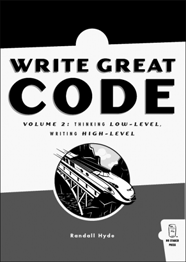
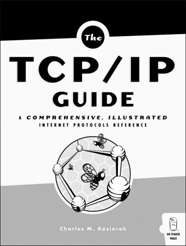
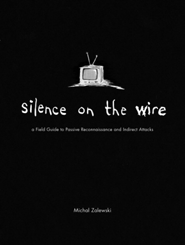
More No-Nonsense Books from
NO STARCH PRESS
WRITE GREAT CODE, VOLUME 2
Thinking Low-Level, Writing High-Level
by
RANDALL HYDE
Today’s computer science students aren’t always taught how to choose high-
level language statements carefully to produce efficient code.
Write Great
Code, Volume 2: Thinking Low-Level, Writing High-Level
shows software engineers what too many college and university courses don’t: how compilers
translate high-level language statements and data structures into machine
code. Armed with this knowledge, readers will be better informed about
choosing the high-level structures that will help the compiler produce
superior machine code, all without having to give up the productivity and
portability benefits of using a high-level language.
MARCH 2006, 640 PP., $44.95 ($58.95 CDN)
ISBN 1-59327-065-8
THE TCP/IP GUIDE
A Comprehensive, Illustrated Internet Protocols Reference
by
CHARLES M. KOZIEROK
Finally, an encyclopedic, comprehensible, well-illustrated, and completely
current guide to the TCP/IP protocol suite for both newcomers and sea-
soned professionals. This complete reference details the core protocols that
make TCP/IP internetworks function, as well as the most important TCP/IP
applications. It includes full coverage of PPP, ARP, IP, IPv6, IP NAT, IPSec,
Mobile IP, ICMP, and much more. It offers a detailed view of the TCP/IP
protocol suite, and it describes networking fundamentals and the important
OSI Reference Model.
OCTOBER 2005, 1616 PP. HARDCOVER, $79.95 ($107.95 CDN)
ISBN 1-59327-047-X
SILENCE ON THE WIRE
A Field Guide to Passive Reconnaissance and Indirect Attacks
by
MICHAL ZALEWSKI
Author Michal Zalewski has long been known and respected in the hacking
and security communities for his intelligence, curiosity, and creativity, and
this book is truly unlike anything else out there. In
Silence on the Wire
, Zalewski shares his expertise and experience to explain how computers and networks
work, how information is processed and delivered, and what security threats
lurk in the shadows. No humdrum technical white paper or how-to manual
for protecting one’s network, this book is a fascinating narrative that explores a variety of unique, uncommon, and often quite elegant security challenges
that defy classification and eschew the traditional attacker-victim model.
APRIL 2005, 312 PP., $39.95 ($53.95 CDN)
ISBN 1-59327-046-1
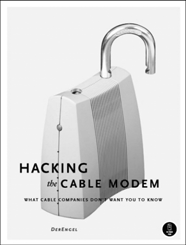
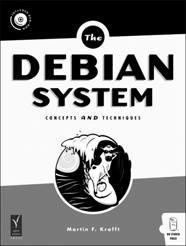
HACKING THE CABLE MODEM
What Cable Companies Don’t Want You to Know
by
DERENGEL
In the beginning there was dial-up, and it was slow; then came broadband in
the form of cable, which redefined how we access the Internet, share infor-
mation, and communicate with each other online.
Hacking the Cable Modem
goes inside the device that makes Internet via cable possible and, along the
way, reveals secrets of many popular cable modems, including products from
Motorola, RCA, WebSTAR, D-Link, and more. Written for people at all skill
levels, the book features step-by-step tutorials with easy to follow diagrams,
source code examples, hardware schematics, links to software (exclusive to
this book!), and previously unreleased cable modem hacks.
SEPTEMBER 2006, 320 PP., $29.95 ($37.95 CDN)
ISBN 1-59327-101-8
THE DEBIAN SYSTEM
Concepts and Techniques
by
MARTIN F. KRAFFT
The Debian System
introduces the concepts and techniques of the Debian
operating system, explaining their usage and pitfalls and illustrating the
thinking behind each of the approaches. The book’s goal is to give you
enough insight into the workings of the Debian project and operating
system that you will understand the solutions that have evolved as part of
the Debian system over the past decade. While targeted at the well-versed
Unix/Linux administrator, the book can also serve as an excellent resource
alongside a standard Linux reference to quickly orient you to Debian’s
unique philosophy and structure. Co-published with Open Source Press,
an independent publisher based in Munich that specializes in the field of
free and open source software.
SEPTEMBER 2005, 608 PP. W/DVD, $44.95 ($60.95 CDN)
ISBN 1-59327-069-0
PHONE:
EMAIL:
800.420.7240 OR
415.863.9900
MONDAY THROUGH FRIDAY,
WEB:
9 AM TO 5 PM (PST)
WWW.NOSTARCH.COM
FAX:
MAIL:
415.863.9950
NO STARCH PRESS
24 HOURS A DAY,
555 DE HARO ST, SUITE 250
7 DAYS A WEEK
SAN FRANCISCO, CA 94107
USA
C O L O P H O N
Inside the Machine
was laid out in Adobe FrameMaker. The font families used are New Baskerville for body text, Futura for headings and tables, and Dogma
for titles.
The book was printed and bound at Friesens in Altona, Manitoba in Canada.